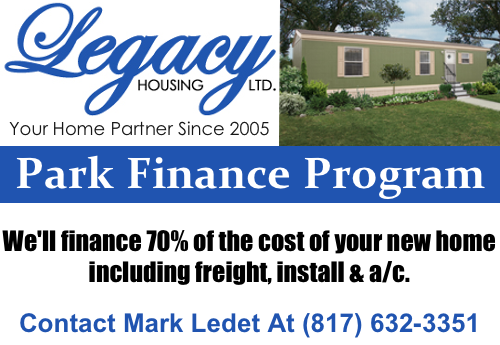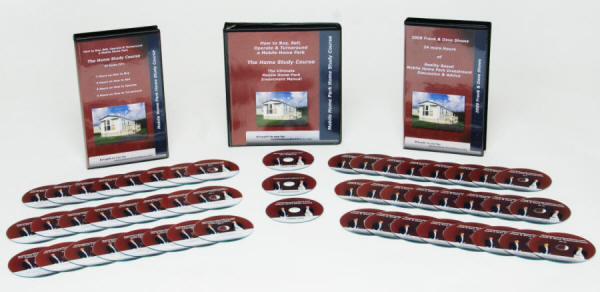When we got in the mobile home park industry almost two decades ago, it was so second rate – as an asset type – that nobody could possibly take it seriously. We used to envy the other real estate asset classes, such as apartments, office and retail, since they had real lenders and industry associations and market reports. Meanwhile, mobile home park owners had cheap plastic versions from the dollar store. Well, it looks like they are finally upgrading us to a real investment type – and we like it.
We have attained respect with Lenders
The best evidence of our “coming of age” is the proliferation of conduit debt available on parks these days. Unlike the last time that conduit popped up in the mid-2000’s and was dominated by LaSalle Bank alone, this time there are at least half-a-dozen lenders making these loans. For those who are unfamiliar with conduit debt (also known as CMBS), it is 10-year term, non-recourse, low interest rate financing that is sold to the public on Wall Street. Mobile home parks, in fact, have the lowest default rate of any asset type in this loan niche. Conduit debt makes mobile home parks on an equal footing with all the other “bigger” real estate segments – and that’s a really big deal. Virtually all of the loans we are doing right now are conduit, and that makes us happy.
The industry association is finally going pro
The Manufactured Housing Institute used to be all about mobile home manufacturing and retailing. Back when there were 400,000 units produced and sold in the U.S. each year (you have to go all the way back to 2000 to remember this), probably 95% of the MHI dues came from such businesses as Fleetwood and Champion (both who went through bankruptcy in recent times). Since sales of mobile homes in the U.S. are now down to under 60,000 units per year, it’s no surprise that the dues from these segments have dried up. This, in turn, led to a total revolution at MHI, and a new group of leaders who, for the first time, are mobile home park driven. The end result will hopefully be accurate information and statistics on mobile home parks. The availability of this type of information is essential to attract and retain institutional investment and financing of parks, as this is what all the other real estate classes already offer through their associations. So the changes at MHI are making us smile, too.
Celebrity players
Hollywood has Brad and Angelina. We have Warren and Sam – and they’re a lot richer. Ever since Warren Buffet’s Berkshire Hathaway purchased Clayton Homes, many institutional investors sat up and took notice. Buffet’s track record supports the hypothesis that he only invests in industries that have a bright future. Buffet is now the largest owner of mobile home manufacturing and financing in the world, and his very presence has given the industry immediate visibility and clout. The same is true of Sam Zell. Zell’s Equity Life Style (symbol ELS) is the nation’s largest owner of mobile home lots, with around 150,000 in inventory. Zell is best known for two other accomplishments: he has also been the largest owner of apartments in the U.S., as well as the largest owner of office space. Like Buffet, he is well known for excellent market timing and performance, so you could not ask for a better industry role model. And the fact that the two most visible industry owners are also of celebrity stature makes us happy.
The “trailer park” stigma is being replaced with “affordable housing”
Maybe it was Jeff Foxworthy who screwed things up back a decade or so ago, but mobile home parks used to get constant negative publicity from the media. Foxworthy published entire books about how pathetic mobile home park tenants are. And the news used to love stories that included a mobile home atrocity – it seemed that every nut case who kept someone buried in a cellar lived in a mobile home. Even the show COPS loved to feature mobile home mania in every episode. Fast forward to today, and those shows and entertainers seem to have disappeared (when’s the last time you saw Jeff Foxworthy on TV?). Instead, most of the media attention today is on “affordable housing” and the plight of the nation’s growing lower income demographic. All of the stories I’ve seen recently had positive attention given to mobile home parks. Even city governments – who used to hate mobile home parks – have now re-directed their hatred to Class C apartments. And this new, positive image is something we really like.
The values are getting high
Twenty years ago, you didn’t see that many parks in the $1 million + price range. Today, there are parks with values up to $50 million. It’s not that mobile home parks have attained a new valuation system. It’s just that rents have risen with demand, and cap rates have gone down slightly as the industry becomes more institutional in nature. There were some large REIT purchases over the past couple years in the sub-8% cap rate area. Now that park owners are sitting on billions of dollars of real estate, they have gained a huge amount of respect from their peers. Of course, mobile home parks are no 800-pound gorilla, but they are at least now a gorilla. And this makes us extremely happy, as we own a lot of these things.
Conclusion
Parents like to say that their kids “are growing up so fast”. Well, that’s not true. Those mobile home park kids took like 50 years to grow up. But at least they finally grew up – and it was about time. While we are unhappy about our real kids growing up and leaving home, we are very excited about our formerly “failure to launch” industry finally moving out of the doghouse and into the executive suite.



